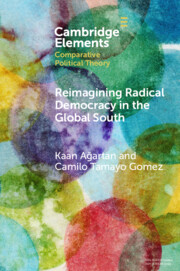Element contents
Reimagining Radical Democracy in the Global South
Published online by Cambridge University Press: 22 November 2024
Summary
- Type
- Element
- Information
- Online ISBN: 9781009498517Publisher: Cambridge University PressPrint publication: 02 January 2025
References
- 2
- Cited by

